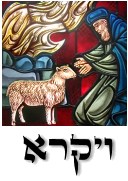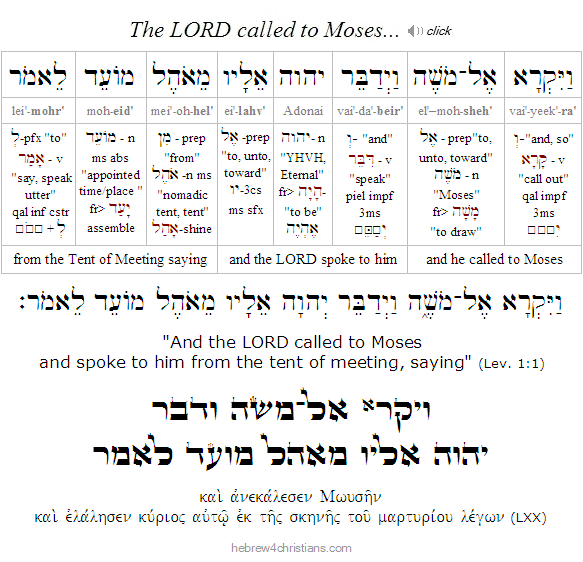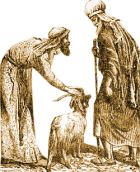|
|
 |
 |
 |
 |
|
Weekly Torah Reading
|
|
|
|
Parashat Vayikra ("and he called")
|
|
|
Click on the links to display the Scriptures:
|
|
|
|
 |
 |
 |
|
Torah Reading Overview
|
|
|
|
The book of Leviticus is called Vayikra ("and He called"), after the first word of the book. In Jewish tradition, Leviticus is sometimes called the "Book of Sacrifices" (הספר זבחים) since it concerns the various offerings brought to the LORD for sacrificial purposes in the Mishkan (Tabernacle). Over 40 percent of all of the Torah's commandments are found in this central book of the Scriptures.
The book opens where the book of Exodus left off, with God calling to Moses from the ohel mo'ed (Tent of Meeting) regarding the laws of the various animal and meal offerings (korbonot) that were permitted to be offered as sacrifices:
|
|
|
 |
 |
|
In Genesis and Exodus we are given historical narrative that reveals both God's cosmic activity as well as His selection of Israel as am segulah - His chosen covenant people. The God who led the Israelites out of Egypt and made covenant with them at Sinai has taken residence among them in the mishkan (Tabernacle). Now that God is in the midst of the people, however, Vayikra reveals how to be in relationship with Him. The key is the sacrificial system.
Historically, of course, there were sacrifices made before the mishkan was constructed as the ritualistic center of the covenant made at Sinai. For example, the following seven tzaddikim (righteous ones) were all said to have offered animal sacrifices before the Tabernacle was consecrated for Israel:
- Adam - According to midrash, after Adam ate the forbidden fruit from the tree of the knowledge of good and evil (etz hada'at tov v'ra'), he experienced darkness for the first time as the sun set. The next morning, however, the sun rose, and Adam then offered an ox upon an altar.
- Abel - Adam's son Abel (Hevel) offered the best of his sheep upon this same altar to the LORD (Gen. 4:2-4).
- Noah - After Noah left the ark, he offered sacrifices of the "clean" animals to the LORD in thanks of having survived the global mabul (flood). Note also that Noah knew the difference between clean (tahor) and unclean (tamei) animals. (Gen. 7)
- Abraham - Abraham built at least four altars and offered animal sacrifices upon them (Gen. 12:7,8; 13:4, 13:18; 22:9).
- Isaac - built an altar and offered sacrifices (Gen. 26:25).
- Jacob - built two altars and offered sacrifices (Gen. 33:20; 46:1).
- Moses - built several altars before he was given revelation of the mishkan at Sinai. These included the sacrifices made after the battle with Amalek (Ex. 17:5) as well as the sacrifices made at the foot of Sinai after receiving the sefer habrit (book of the Covenant) (Exod. 24:4-6).
The Korban Principle:
Sin, Sacrifice, and Confession
|
|
|
 |
 |
|
When a person sins against the LORD, he or she deserves to die. Satan, the accuser, comes before God and makes a case for the person's neshama (soul), but God allows the death of a sacrificial victim to take the place of the sinner. The guilty person leans his hands upon the head of the animal (semichah) and then says viduy (confession): "I deserve to die instead of this innocent animal, but the LORD mercifully accepts the death of this innocent one in my stead." When God sees the shed blood or ascending smoke of the sacrifice, he forgives the sinner based on his faith and teshuvah (repentance).
|
|
 |
 |
|
The Torah states that of all the various kosher animals, only three kinds would be acceptable for sacrifice upon His altar: defect-free oxen (a bull or cow), sheep (a ram or ewe), or goats (a buck or doe). Each kind of these animals is domesticated and peaceful. Besides these mammals, only two birds were allowed to be sacrificed: turtledoves and pigeons, both of which are likewise non-raptorial and peaceful. In addition to these animal sacrifices, a poor person could offer grain offerings which were used to provide bread for the kohanim (priests).
|
 |
 |
|
Five Types of Korbanot
|
 |
 |
|
There are five types of korbonot detailed in this parashah:
- Olah (עלָה), an "ascending offering": This was a freewill (i.e., nedavah: נְדָבָה) sacrifice that was consumed entirely by the fire on the altar. The sacrificial victim must be an animal or a bird that is without defect. As the animal is slaughtered, the kohen catches its blood in a pan and sprinkles it (zerikat hadam) on the altar. The animal is then cut up, salted, and entirely burned. Normally, semichah (leaning of the hands on the head of the animal) and viduy (confession of sin) accompanies this sacrifice (though in the case of a bird olah, semichah is not performed).
- Minchah (מִנְחָה), "meal offering": This was a nedavah (freewill) offering of flour (prepared with fine flour, olive oil and frankincense), usually brought by a person of modest means. Part of the meal offering is burned on the altar, and the remaining part is eaten by the kohanim (the word "mincha" means gift). Note that any flour offering must be baked quickly to prevent the dough from rising (i.e., unleavened bread). Like the animal sacrifices, minchah offerings must also be salted.
- Shelamim (שְׁלָמִים), "peace offering": This was a nedavah (freewill) offering (eaten by the one bringing it) given as a way of expressing thanks to God on joyous occasions. Semichah is performed, though instead of viduy, praise to the LORD is offered.
- Chatat (חַטַּאת), "sin offering": This was a chovah (required) offering to make atonement for certain sins committed unintentionally by an individual (by the High Priest, the entire community, the king, or the ordinary Jew). Note that there is no explicit sacrifice for deliberate, intentional, and willful sins against the LORD, but instead punishment by an early death.
- Asham (אָשָׁם), "guilt offering": This was a chovah (required) offering as part of the penitence required for certain improper acts (e.g., retaining another's property by swearing falsely). (In each case, the wrongdoer was required to restore the property plus an additional 20% to its rightful owner before he could offer this sacrifice and receive forgiveness.)
Note that the sin offerings (chatat and asham) were chovah (obligatory) for atonement to be made. They had to be offered by the anointed High Priest who would sprinkle the blood of the sacrifice seven times inside the Mishkan (tabernacle) on the golden altar opposite the parochet (the curtain before the Holy of Holies). The chalabim (fat) was burned on the altar, but unlike the other offerings the rest of the animal (its hide, flesh, and its body parts) would be taken "outside the camp" to be burned with fire.
The Talmud (Yoma 2:2) states that five miracles occurred with the fire that descended from heaven:
- The flame lay on the altar (i.e., mizbe'ach: מִזְבֵּחַ) in the form of a lion.
- The fire shone as brightly as the sun.
- The fire actually had a substance.
- The fire consumed wet and dry alike.
- The flame did not produce any smoke.
Jewish midrash states that the meat of the korbanot never spoiled, even if it took days before it was burned upon the altar. Moreover, despite the presence of blood all over the mishkan, no flies swarmed the area on account of its special sanctity.
Note: Despite the fact that the sacrificial system was abandoned after the Second Temple was destroyed in the year 70 AD (after the Mashiach Yeshua had come as our Kohen Gadol (High Priest) of the New Covenant), Leviticus continued to exert an influence on Jewish life, since nearly half of the 613 commandments are found in it and much of the Talmud is based on it. In Europe, it was traditional for children beginning their Hebrew studies to start with the book of Vayikra, which is a custom still practiced today.
|
 |
 |
 |
 |
 |
 |
|
 |
|
|
|
Haftarah Reading Overview
|
|
|
|
The Haftarah for Vayikra primarily concerns the problem of idolatry. Israel, God's chosen nation, had turned from the sacrificial worship ordained by the LORD to mere idols made of wood and of stone. Nonetheless, God is faithful to Israel and will forgive and restore them to Himself.
|
|
|
 |
|
|
|
Brit Chadashah Overview
|
|
|
|
The readings from the Brit Chadashah concern the superiority of the sacrifice of the Mashiach as the "once for all" sacrifice for sin. Instead of daily sacrifices and offerings, the Mashiach came to fulfill the will of God by becoming obedient to all that the Law required and by offering Himself up as the ultimate Sacrificial Victim, truly without spot or blemish.
"When he said, 'You have neither desired nor taken pleasure in sacrifices and offerings and burnt offerings and sin offerings' (these are offered according to the Torah), then he added, 'Behold, I have come to do your will.' He abolishes the first in order to establish the second. And by that will we have been sanctified through the offering of the body of Jesus Christ once for all" (Hebrews 10:8). "For by a single offering he has perfected for all time those who are being sanctified." (Hebrews 10:14).
Moreover, just as the blood of the sin offering was brought into the Holy Place by the anointed High Priest, so Yeshua presented His own blood in the Holy Place made without hands, and then "suffered outside the camp":
"We have an altar from which those who serve the tent have no right to eat. For the bodies of those animals whose blood is brought into the holy places by the high priest as a sacrifice for sin are burned outside the camp. So Jesus also suffered outside the gate in order to sanctify the people through his own blood. Therefore let us go to him outside the camp and bear the reproach he endured. For here we have no lasting city, but we seek the city that is to come. Through him then let us continually offer up a sacrifice of praise to God, that is, the fruit of lips that acknowledge his name." (Hebrews 13:10-15)
One of the roles of our beloved Mashiach Yeshua (Jesus Christ) is that of Kohen HaGadol (High Priest) who offered true kapparah [atonement] for our sins by offering His own blood in the Holy of Holies made without hands. As it is written in the letter of Hebrews:
Therefore, holy brothers, you who share in a heavenly calling, consider Jesus, the apostle and high priest of our confession, who was faithful to him who appointed him, just as Moses also was faithful in all God's house. (Hebrews 3:1-2)
The Importance of a Blood Sacrifice
In Leviticus 17:11 it is written:
"For the life of the flesh is in the blood, and I have given it for you on the altar to atone (l'kapeir) for your souls, for it is the blood that makes atonement (y'khaper) by the life."

A blood sacrifice is required by the LORD for the issue of sin. Leviticus 17:11 agrees with the teaching in the B'rit Chadashah in Hebrews 9:22: "Without the shedding of blood there is no remission." In Yoma 5a it is likewise written, "There is no atonement without blood." The substitutionary shedding of blood, the "life-for-life" principle, is essential to the true "at-one-ment" with the LORD God.
Yeshua offered His own body up to be the perfect Sacrifice for sins. By His shed blood we are given complete atonement before Adonai. The Levitical system of animal sacrifices, including the elaborate Yom Kippur ritual, was meant to foreshadow the true and abiding Sacrifice of Yeshua as the means of our reconciliation with God. The B'rit Yeshanah (Old Covenant) provides a shadow of the substance revealed in the B'rit Chadashah (New Covenant). If the old covenant had been sufficient to provide a permanent solution to the problem of our sin, there never would have been need for a new covenant to supercede it (Hebrews 8:7).
Under the old covenant, sacrifices merely "covered" sins, but under the new covenant, these sins are taken entirely away (Hebrews 7:27, 9:12, 9:25-28). There is no more need for continual sacrifices, since Yeshua provided the once-and-for-all sacrifice for all of our sins (Hebrews 9:11-14; 9:24-28; 10:11-20).
Indeed, Yeshua ha-Mashiach is the "propitiation" or "expiation" for our sins. The Greek word used in Romans 3:25, 1 John 2:2, and 1 John 4:10 ("hilasterion") is the same word used in the LXX for the kapporet [cover of the ark of the covenant] in the Holy of Holies which was sprinkled with the blood of the sacrifice on Yom Kippur.
For Messiah has entered, not into holy places made with hands, which are copies of the true things, but into heaven itself, now to appear in the presence of God on our behalf. Nor was it to offer himself repeatedly, as the high priest enters the holy places every year with blood not his own, for then he would have had to suffer repeatedly since the foundation of the world. But as it is, he has appeared once for all at the end of the ages to put away sin by the sacrifice of himself... So Messiah, having been offered once to bear the sins of many, will appear a second time, not to deal with sin but to save those who are eagerly waiting for him. (Hebrews 9:24-ff)
Have you personally made semichah by laying hands on Jesus as your sacrifice for sin? Have you made viduy (confession) of your need for deliverance through Him?
Blessing:
|
|
 |
|
|
 |
|
|
 |
 |
|
For Further Study:
|
|
|





